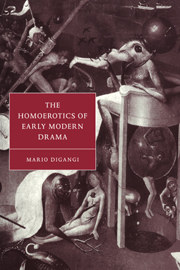Book contents
- Frontmatter
- Contents
- Preface
- 1 Introduction
- 2 The homoerotics of marriage in Ovidian comedy
- 3 The homoerotics of mastery in satiric comedy
- 4 The homoerotics of favoritism in tragedy
- 5 The homoerotics of masculinity in tragicomedy
- Notes
- Bibliography
- Index
- Cambridge Studies in Renaissance Literature and Culture
5 - The homoerotics of masculinity in tragicomedy
Published online by Cambridge University Press: 02 December 2009
- Frontmatter
- Contents
- Preface
- 1 Introduction
- 2 The homoerotics of marriage in Ovidian comedy
- 3 The homoerotics of mastery in satiric comedy
- 4 The homoerotics of favoritism in tragedy
- 5 The homoerotics of masculinity in tragicomedy
- Notes
- Bibliography
- Index
- Cambridge Studies in Renaissance Literature and Culture
Summary
Soldiers, lovers, and Renaissance gender ideology
Although women play only a minor role in the predominantly male world of Chapman's tragedies, anxieties about effeminacy pervade his depictions of the erotically disordered early modern court. The resentment Chapman's soldiers feel about the effeminacy of a pacifist courtly culture was frequently voiced in late sixteenth- and early seventeenth-century English texts. A good example of such a text is Barnabe Riche's Farewell to Military Profession (1581), to which I would like to turn momentarily before considering how similar concerns are manifested in the drama.
In his dedicatory epistle to “Right Courteous Gentlewomen,” Riche describes his transformation from a soldier and former author of military books into a writer of “very pleasant discourses fit for a peaceable time: gathered together for the only delight of the courteous gentlewomen.” A belated discovery of courtly pleasures explains why Riche, “having spent [his] younger days in the wars among men and vowed [himself] to Mars, should now, in [his] riper years, desire to live in peace amongst women and to consecrate [himself] wholly unto Venus” (123). Although the swearing of vows to both Mars and Venus implies Riche's devotion to men of war no less than to women of pleasure, his gendered antithesis is neither as stable nor as foundational as first appears. For he goes on to confess that he finds “more sound sleeping under a silken canopy close by a friend than under a bush in the open field within a mile of our foe.”
- Type
- Chapter
- Information
- The Homoerotics of Early Modern Drama , pp. 134 - 161Publisher: Cambridge University PressPrint publication year: 1997
- 1
- Cited by



